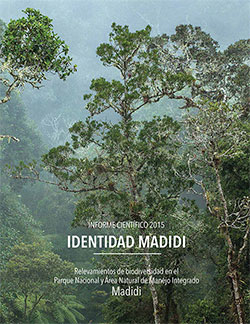Madidi National Park maintains environmental functions that are essential to the lives of the communities and populations of northern La Paz, regulating the climate, preserving the headwaters of watersheds, maintaining freshwater sources, reducing carbon dioxide emissions, and protecting wild native crops. The deforestation rate in Madidi is eight times lower than in other areas in northern Amazonian La Paz Department.
Madidi's forests are an important reservoir of 228,253,327 tons of carbon (16.71% of CO2 storage in national protected areas), which contribute to mitigating the effects of climate change. These forests maintain 15 large watersheds and 1,800 rivers that provide water to the urban and rural population of the municipalities of Apolo, Ixiamas and San Buenaventura. They are part of the Amazon forest cover that generates and moves humid air masses carrying rainfall to the Andes, including La Paz.
Through the safeguarding of wild plants that originated vital agricultural products for our food, their capacity to adapt to climate change is strengthened. The high Andean zone and the valley headwaters are the center of origin of Andean tubers and grains including potatoes, oca, papalisa, quinoa and isaño; while the Amazon forests are home to other plants of agricultural importance, including cocoa, custard apple, cassava, peanuts and pineapple.




 Facebook
Facebook Instagram
Instagram YouTube
YouTube